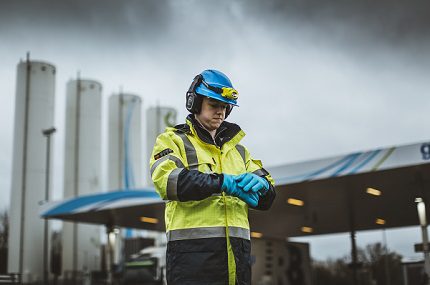Opinion
Sustainability without compromise
Hazchem Safety, a technical workwear provider to the fuel & gas distribution industry for the past 25 years, explains to fuel oil news some of the ways in which it is working to supply sustainable variations of hi-vis workwear, footwear and PPE as well as ways to recycle end-of-life garments.Working in an industry where carbon emissions are, for now, inevitable, the small efforts which businesses make to become more sustainable are crucial. Slight changes in operations from paperless transactions to eco-friendly uniforms are some of the ways to work towards net zero.
Whatever your specification of workwear or PPE, Hazchem believes that you don’t have to be left out of the Green Revolution and is working to offer sustainable solutions.
Why should you consider sustainable garments?
The clothing industry contributes a shocking 10% of the planet’s greenhouse gas emissions, which is more than the entire aviation or shipping industries. Most unwanted clothing ends up in landfill or is incinerated when the raw materials could be reused in further garment production, a process which uses less fossil fuel and produces less emissions, than if they were to be made from brand new materials.
Sustainable garments are set to become permanent fixtures within technical workwear product lines, offering the same necessary safety specifications with less damage to the planet.
In response to end users’ needs for ‘green’ solutions to everyday operations, Hazchem is expanding its product lines to give customers a choice of sustainable options, such as the Ecovis range of hi-vis EN ISO 20471 garments, produced with 100% recycled polyester, with the same visibility and added environmental considerations, such as bio-degradable product packaging.
Something new – FR Fabrics with sustainable sources and processes
Taking advantage of innovations such as ModacrylicECO™ blend fabrics, Hazchem product manager, Rick Clark, explained how the company is developing inherent flame resistant and ARC Workwear using a sustainable and natural fibre. With customers at the focus point, Hazchem is keen to source and develop environmentally conscious workwear options which can be used seamlessly within the industry.
ModacrylicECO™ fabrics from HAZTEC® include a substantial content that is from sustainable materials and sources, and produced with eco-friendly processes requiring less transportation than that needed for the production of cotton. This content has minimal environmental impact, and even solvents used in the process are captured to be used again.
Sustainable safety footwear
Committed to providing customers with what they need, Hazchem is seeking out sustainable workwear options such as the COFRA GreenFit footwear range, constructed with eco-friendly materials.
Using COFRA’s own innovative material, ‘Poly-Green’, a blend of virgin and recycled Polyurethane used in various parts of the shoe, makes for a perfect combination of support and shock absorption. Without compromising on necessary technical specifications, this carefully considered material is also antistatic, antibacterial, and anatomic, keeping the feet dry and the wearer safe and comfortable.
Chosen for its commitment to sustainability, the COFRA footwear range features laces and labels made from 100% recycled bottles. In addition, each pair from this range is packaged in a 100% recycled paper carton.
Want not? Waste not! End of life garment recycling
Responding to common problems experienced with technical workwear by their customers, Hazchem has developed a 100% sustainable and traceable system for securely disposing of company branded garments – through shredding end-of life garments so they are ready to be re-used as Geotextiles, special papers, and other innovative products.
Recycling technical workwear may seem a complex, specialised process, but Hazchem’s system is simple, with a straightforward collection service from your site. Whether this collection is a one-off, weekly, monthly or every 6 months, your end-of-life garments are safely shredded, re-purposed, and a certificate is issued to prove it.
